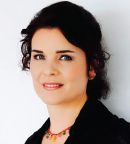The first sign that I could have a life-threatening illness was a bout of severe dizziness, which sent me first to a general practitioner for a physical examination and then to an ear specialist for more tests. At just 24 and in excellent health, the sudden onset of dizziness didn’t initially set off any alarm bells, and I had no other clear symptoms to raise concern. It wasn’t until an MRI scan of my head showed a tumor, about the size of a quarter, in my left temporal lobe that I understood the seriousness of my illness. The diagnosis has presented challenges that have transformed the past 18 years of my life.
Because the tumor was located in the sensitive area of my brain that controlled my speech, hearing, and memory, I decided to enroll in an awake–brain mapping surgical clinical trial at the National Institutes of Health. There neurosurgeons removed the tumor along with surrounding brain tissue, and this is where the specifics of my diagnosis took multiple turns.
The pathology report showed that I had grade II oligodendroglioma, and it was recommended that I have a second opinion to confirm the diagnosis and treatment possibilities. In the end I had four medical opinions. The second reading of my pathology report found that I had grade III oligoastrocytoma, which meant that I would have to undergo adjuvant chemotherapy and radiation, and sent me into a panic. The third reading of my report agreed with the initial finding, and the fourth interpretation determined my tumor was grade II mixed oligoastrocytoma and required no further treatment. Since this last determination was made at a world-renowned cancer center, and two earlier readings, also from well-respected cancer centers, concurred the tumor was grade II, I decided to closely monitor my tumor status with frequent MRI scans and go on with my life.
The Toll of Having a Brain Tumor
Although I was regularly monitored with imaging scans at this world-renowned cancer institution from 1998 to 2004 and assured by my neuro-oncologist that there were no signs of tumor recurrence, I later learned from another neuro-oncologist at the institution that the scans had in fact shown a recurrence since 2000 and that I would need a second brain surgery.
The news, of course, was shocking, and I sought out two more opinions from other top-notch cancer institutions, which recommended monitoring with MRI imaging and no immediate treatment. Over the next several years, I used various alternative and self-care strategies to try to halt tumor cell activity and experienced some very important benefits. However, my tumor continued to grow, and in 2011 I underwent a second surgery, which removed most of the tumor, and I pursued integrative modalities with the hope of helping me transform the undesired challenges of this disease. Despite all my best efforts, the tumor continued to grow, and in 2013 I had a third surgery.
Since the surgery was unable to completely remove the tumor, I was prescribed 6 weeks of radiation therapy and daily doses of temozolomide, which helped shrink the remaining tumor. Two months later I received the experimental immunotherapy DCVax-L with a dendritic cell-based vaccine. Although a small portion of my tumor remains, there are no signs it is growing, and I feel extremely well.
Charting a New Course
Over the past 18 years, I’ve navigated my way through multiple brain surgeries, many rounds of conventional and integrative therapies, and about 100 MRI scans. My journey striving against this brain tumor and focusing on my optimal health and healing has infused my life with new meaning. I’m determined to help improve the lives of people affected by cancer through my work as an educator, including the incorporation of integrative medicine to treat the whole person and not just the cancer as well as the importance of self-advocacy and self-care to improve survivors’ quality of life.
Since my diagnosis, I’ve worked and consulted for the U.S. Congress, several cancer organizations, the National Cancer Institute, the U.S. Food and Drug Administration, the National Institutes of Health National Center for Complementary and Alternative Medicine’s Clearinghouse [now the National Center for Complementary and Integrative Health] as well as major cancer centers and clinics. On the fast track to a high-powered career before my brain tumor diagnosis, I now know this is the work I was meant to do. I’m extremely grateful to be alive and to contribute to the support and well-being of patients with brain tumors. I’m well aware of the possible uncertainties in my life, and that knowledge motivates me every day to accomplish much more. ■
Jeannine Walston is a cancer coach, writer, speaker, and consultant. She lives in Los Angeles.


